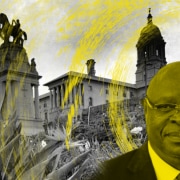|
Getting your Trinity Audio player ready...
|
Image: Newzroom Afrika
The National Prosecuting Authority’s (NPA) investigative directorate (ID) is now a permanent fixture in South Africa’s law enforcement infrastructure, following Cabinet’s approval of the NPA Amendment Bill last week. It is a welcome move, provided several provisions are made to ensure its independence and protection from political interference, according to Corruption Watch’s executive director Karam Singh. He was interviewed by Newzroom Afrika on the matter.
For the ID to function well in pursuing and concluding the high-profile corruption cases that fall within its mandate, said Singh, it must be properly structured, resourced, and capacitated to meet targets. The budget must be sufficient to enable it to acquire specialised skills in data analytics and forensic investigations, for instance, which are critical in complex corruption investigations.
“The resourcing must be commensurate with the structure. If the ID is talking about, for instance, employing some of our top forensic investigators, our top data analytic or cyber analytic forensic people … these are specialised skills and they would require an appropriate budget … presumably with the legislation going through there would be the appropriate regulation to either bring staff in from other agencies or bring staff in from inception. But obviously an entity like this won’t work if it’s not effectively resourced.”
Even with that in mind, Singh argues that to have a structure like the Scorpions did in the early to late 2000s – with prosecution-led investigations – is important, and the model has been successful in other countries around the world. The ID may not pass muster in that respect, he says.
In this context, however, the timing also must be questioned. “On the other hand it does raise some concerns about what is the approach from this administration broadly to reforming the institutional architecture in the fight against corruption because there are other initiatives which are ongoing which haven’t been completed. So the timing of this, although it was announced some time ago, seems like it might be premature in some ways.”
Permanence and independence
President Cyril Ramaphosa announced the move to make the ID permanent in October last year, when he addressed South Africans with government’s response to the state capture commission’s recommendations. On its role in the broad anti-corruption infrastructure, he said: “Greater capacitation and resourcing of these bodies is needed, as are wider initiatives of institutional reform. We are determined to build law enforcement agencies that are well capacitated and independent, with clearly delineated responsibilities, and that are able and empowered to effectively collaborate.”
The ID was established in 2019 to address complex corruption cases that arose out of the commission’s investigations. With an initial lifespan of two years, it was meant to bolster such cases to give the NPA the necessary advantage in dealing with them.
Following the ID’s establishment, Ramaphosa announced further amendments to the commission’s regulations in 2020, to enable the ID to tackle investigations in parallel with the commission. What this meant was that the commission could share information with the ID in some of the cases, for the latter to proceed with its own probe.
On the point of its independence, Singh emphasised the need to regulate appointments to the leadership of such institutions: “One of the ways you ensure that independence is ensuring special rules and requirements around appointments, that the best people get appointed into the leadership positions, and that it’s not easy to dismiss or fire people the way we saw former president Thabo Mbeki tamper with the tenure of then national director [of prosecutions] Vusi Pikoli.”
Pikoli was suspended in 2008, following the Scorpions’ probe into then national police commissioner Jackie Selebi. He would later be fired by Mbeki’s successor, Kgalema Motlanthe, and the unit itself disbanded.
Singh argues that we need to look at the long game nature of establishing the independent institutions that we want as a country. “We need to avoid defeatism when it comes to thinking about building resilient institutions. You don’t do it overnight. It takes time to build a democracy, and we need to double down on the fact that we need to have strong, resilient capacitated, but critically, independent institutions that can’t be easily captured or easily tampered with.”
The ID is headed up by Advocate Andrea Johnson, who joined the unit at the beginning of 2022 following the resignation of Hermione Cronje from the post.








